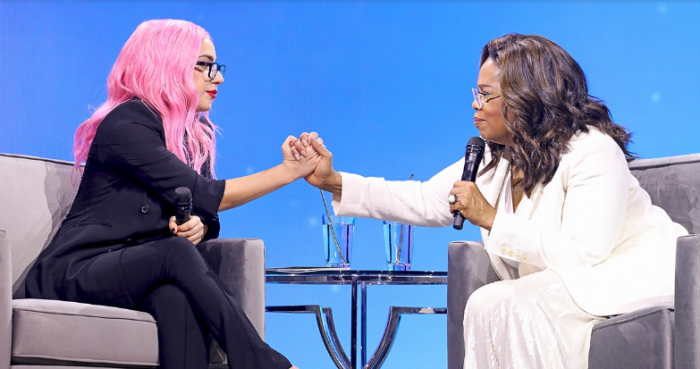“The path out of hell is through misery. By refusing to accept the misery that is part of climbing out of hell, you fall back into hell.” ~ Marsha Linehan
~
In her genuine and heartfelt interview on Oprah’s 2020 Vision Tour of Visionaries, Lady Gaga unapologetically declared that mental health is a crisis.
She speaks about how ongoing sexual assault at the age of 19 left her with post-traumatic stress disorder and later, fibromyalgia, a related chronic pain condition. It was then that she brought up the topic of radical acceptance, and how the radical acceptance that she would be in pain every day gradually helped to ease her pain.
This wasn’t the first time I heard of radical acceptance. I am trainer of Dialectical Behaviour Therapy (DBT), a skills training treatment program developed by the renowned Marsha Linehan. Lady Gaga is a strong advocate for DBT as a treatment modality, and spoke about how in DBT she learned about radical acceptance. It is a skill that Linehan gleaned from her own journey into Buddhism.
As a trainer of DBT, I cannot teach a skill that I cannot also practice. So I delved into increasing my understanding and practice of radical acceptance and how I could apply it to my own life. I want to share the most important points for your benefit and journey.
Oprah Winfrey summed up radical acceptance as, “Wanting something to be what it isn’t” and recognizing “it doesn’t change until you first accept it for what it is.”
Radical acceptance is complete and total openness to the facts of reality as they are, without responding with stubborn ineffectiveness or throwing a tantrum. Lady Gaga, in her interview, says:
“I have radically accepted that I will put my shame in a box all the way over there, and make it very small, and say to myself, I have mental health issues. I take a lot of medication to stay on board and I am a survivor. I am living and I am thriving and I am strong and I am going to take all my life experiences and I am going to share them with the world and make it a better place.”
Radical acceptance is when you stop fighting and resisting reality. It’s saying, “My partner is emotionally unable to meet my needs” as opposed to, “I can’t stand him. He is so selfish. If only he would listen to me and stop belittling me.”
Radical acceptance is when you stop throwing tantrums because reality is not how you want it to be. It’s saying, “I may not have caused all the problems I have, but I have to solve them anyway,” instead of “How dare they lie to me. People should work harder at changing themselves because I did not create this problem.”
When I radically accept, I can let go of my bitterness, my resentment, undue shame and guilt, which are all results of a failure to accept reality as it is. So, what exactly has to be accepted? Everything—all the facts about the past and the present, even if I do not like them.
But what’s important to remember is that accepting something as it is does not mean that we need to approve of it. People struggle with this, especially those who have been through traumatic experiences. Radical acceptance is not condoning the trauma, it is simply accepting that it did occur.
Why do I need to accept reality? Well resisting and rejecting reality does not change it. Have you ever heard the saying, “What you resist will persist”? We cannot change reality unless we accept reality, because if we don’t, we have limited options to solve our problems because we have a distorted perception of reality. I continue to blame the system I work in instead of acknowledging that I am afraid to find another job, or that my real issues are not even about work. So I continue to whinge and create distress for myself and others about how awful work is and how I hate the place I work in. In doing so, we are deflecting what the problem truly is. We are rejecting reality.
We expand our options when we accept reality as it is and go from there. How often do we do everything we can to avoid pain? We drink, we work, we binge watch Netflix, we overeat. We do all this to avoid listening to and attending to the necessary signals that nature is providing to let us know that something is wrong. When we willfully reject reality, we increase our pain and our suffering. We remain stuck in unhappiness, bitterness, anger, sadness, shame, and other painful emotions.
I have struggled with radical acceptance, especially when what I had to accept were the painful events and facts in my life. Somehow, I had myself believing that if I accepted really painful events that I would not be able to prevent future painful events.
For example, when dealing with everyday racism and prejudice, I find that my intense feelings of anger and injustice get in the way of accepting what is. I get caught up in how ignorant people are. I want them to think before they say insensitive things. Instead, I found more and more people unwilling to admit that what they were saying was offensive. Maybe they were also rejecting reality. In some ways, I felt that if I simply accepted that racism and prejudice were bound to happen often, I was making light of it. To say that prejudice and racism will continue to exist in the world did not immediately bring peace—but it did teach me that radical acceptance is a practice.
Here are Marsha Linehan’s 10 steps for practicing radical acceptance:
1. Notice when you are fighting or resisting reality. You could be saying, “It shouldn’t be this way.”
2. Remember that unpleasant realities cannot be changed. This happened. Trump is the president!
3. You can notice how reality took shape and came to be because reality has causes. It just didn’t appear out of nowhere.
4. Find creative ways to accept reality as it is with your mind, body, and spirit. Use all your senses and multiple activities like mindfulness, going to a place that helps bring acceptance, imagery, or art.
5. Act in ways that show you accept reality. Engage in the behaviours that you would do if you really had accepted reality as it is. You could be peaceful and unaffected by another’s choices or experiences if you stop insisting that they should behave a certain way.
6. Practice accepting what you imagine to be unacceptable. Imagine if you could accept that there are really unwell people in the world who are going to say and do unhealthy things. Imagine how you would feel if you accepted that this is a fact.
7. Attend and listen to bodily sensations as you think about what you need to accept in a given moment or situation. Can you feel your muscles relax or tense?
8. When we practice radical acceptance, feelings of disappointment, sadness, or grief will arise—allow them to. When an adult accepts that they never received the love they needed from their parents, feelings of disappointment and loss arise.
9. Allow yourself to experience pain and see it as a natural part of the process of healing. Don’t push them away or try to avoid or minimise them.
10. If you find yourself resisting reality, do a pros and cons list about practicing radical acceptance for your current situation.
As a mindful lifer, I am challenging myself to practice radical acceptance. We can learn from the inspiring story of Lady Gaga and accept the reality of our situations as it is. After all, what we resist will persist, and we cannot change it if we don’t accept it as is.
~
~









Read 4 comments and reply